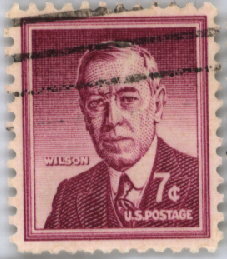The Era Of Expansion And Reform:Introduction
"We must abolish everything that bears
even the semblance of privilege."
Between two great wars-the
Civil War and the
first World War-the United States of America came of age. In
a period of less than 50 years it was transformed from a rural
republic to an urban state. The frontier vanished. Great factories
and steel mills,
transcontinental railroad lines, flourishing cities,
vast agricultural holdings marked the land. With these came
corresponding evils. Monopolies tended to develop. Working
conditions were often poor. Cities grew so quickly they could not
properly house or govern their teeming populations. Factory production
sometimes outran practical consumption.
Woodrow Wilson
Message to Congress, April 8, 1913
 Reaction against these and other abuses came from the
American people and their political leaders -
Grover Cleveland, William Jennings Bryan,
Theodore Roosevelt,
Woodrow Wilson.
Articulate reformers, idealistic in philosophy but realistic in
execution, underscored the need for reform, and the accomplishments
of the period did serve effectively to check the wrongs engendered
by over-rapid expansion.
Reaction against these and other abuses came from the
American people and their political leaders -
Grover Cleveland, William Jennings Bryan,
Theodore Roosevelt,
Woodrow Wilson.
Articulate reformers, idealistic in philosophy but realistic in
execution, underscored the need for reform, and the accomplishments
of the period did serve effectively to check the wrongs engendered
by over-rapid expansion.
"The Civil War," says one writer, "cut a wide gash through the history of the country; it dramatized in a stroke the changes that had begun to take place during the preceding 20 or 30 years......" War needs had enormously stimulated manufacturing and had speeded an economic process based on the exploitation of iron, steam, and electric power, and the forward march of science and invention. In the years before 1860, 36,000 patents were granted; in the next 30 years, 440,000 patents were issued, and in the first quarter of the 20th century, the number reached nearly a million.
As early as 1844, Samuel F. B. Morse had perfected electrical telegraphy, and soon afterward distant parts of the continent were linked by a network of poles and wires. In 1876, Alexander Graham Bell exhibited a telephone instrument and, within half a century, 16 million telephones would quicken the social and economic life of the nation. The growth of business was speeded by the invention of the typewriter in 1867, the adding machine in 1888, and the cash register in 1897. The linotype composing machine, invented in 1886, the rotary press and paper-folding machinery made it possible to print 240,000 eight-page newspapers in an hour. Edison's incandescent lamp lit millions of homes. The talking machine, too, was perfected by Edison, who, in conjunction with George Eastman, also helped develop the motion picture. These and many other applications of science and ingenuity resulted in a new level of productivity in almost every field.
Concurrently, the nation's basic industry - iron and steel - was forging ahead, protected by a high tariff. Previously concentrated near deposits in the eastern states, the iron industry moved westward as geologists discovered new ore deposits. Especially notable was the great Mesabi iron range at the head of Lake Superior, which became one of the largest ore producers in the world. The ore lay on the surface of the ground and was easy and cheap to mine. Remarkably free of chemical impurities, it could be processed into steel of superior quality at about one-tenth the previously prevailing cost.
- National Inventors Hall of Fame by Inventure Place
